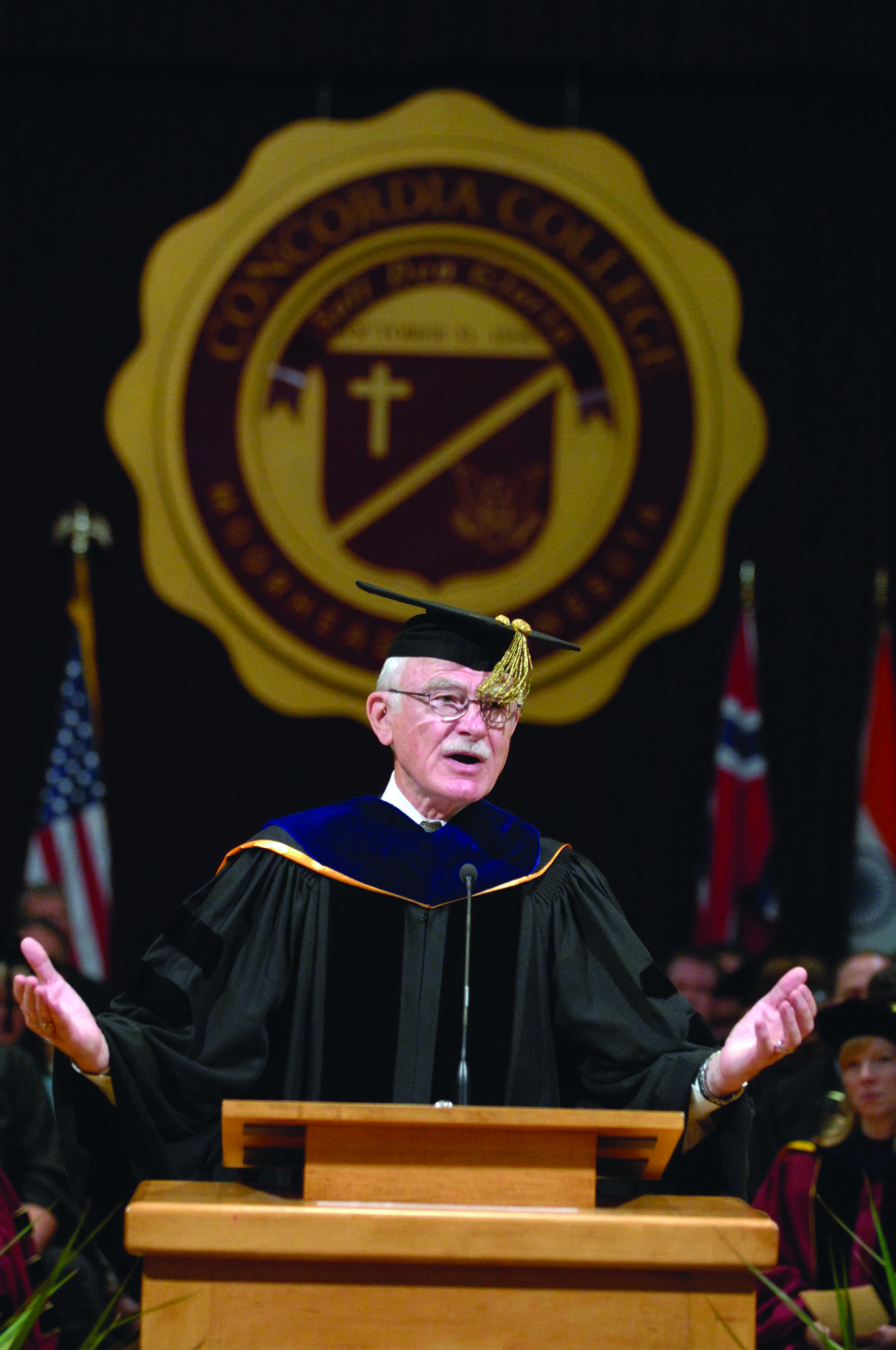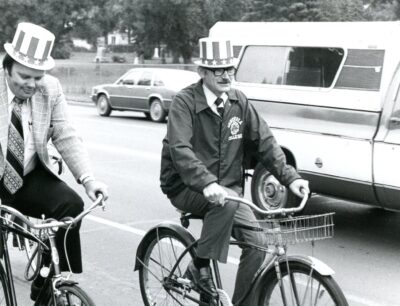
Dr. Paul Dovre led Concordia College as its president from 1975 until his retirement in 1999, then returned twice as interim president while the Board of Regents searched for successors. (Photos/Concordia College.)
- Concordia associate dean Morrie Lanning (at left) and Paul Dovre bike the route of the Greater Moorhead Days parade in the mid-1970s.
- Mardy and Paul Dovre married 66 years ago. She was, he says, “an essential part” of his nearly four decades on the Concordia campus.
“This honor isn’t only for me … it’s for all of us, and what, together, we were able to accomplish.” – Dr. Paul Dovre
Nancy Edmonds Hanson
It’s been 72 years since Paul Dovre arrived in Moorhead, fresh off the farm, wondering what the future would hold. Little did the newly minted Cobber realize that the Concordia College campus would be the launch pad for a leader who has left an indelible impact on higher education, on tens of thousands of students, and on the Fargo-Moorhead community over the lifetime that lay ahead.
You can expect to learn much more about that lifetime in the coming days. On Oct. 10, the Fargo Moorhead West Fargo Chamber of Commerce will honor Dr. Dovre with its 20th Legacy Leader Award, honoring “the profound impact and commitment of long-time local leaders” who have “served and shaped our community and the greater region.”
And just a month or so later, Dovre will recount that story in his own way. From the family farm in Yellow Medicine County, where he raised cattle as a 4-Her, to college presidency and beyond, his autobiography – “In Strength and Faith” – takes what he calls “a candid look” at the values and questions that still propel him.
His memoir, he says, goes far beyond the achievements highlighted by the Chamber’s leadership award. “I’ve written about everything from my childhood to college, military service, grad school and the years since I retired,” he muses. “My years at Concordia, of course, are the heart of the book.” He adds, “I talk frankly about some of the mistakes I made as president as well as the successes. It’s candid look at my years there.” He smiles. “And they (the college) wanted to publish it anyway.”
When Paul arrived on the Moorhead campus back in 1952, he was unsure of the direction he wanted to pursue. He settled on speech and economics – the latter because, as he says, “I was still looking at farming.” His father offered to acquire a nearby ranch where he could return to raise beef cattle.
By that time, though, he was committed to academia. After taking a break for two years in the Army and returning to finish his bachelor’s studies in 1958, he enrolled at Northwestern University, where he earned a master’s degree and doctorate in rhetorical theory and public address. What next? After professors and colleagues told him, “You ought to look at becoming a preacher,” he did spend one year at Luther Seminary. “That’s where the paths crossed – higher education and theological studies,” he reflects. “I decided to go back to teaching.”
While professors who had mentored him suggested he consider the scholarly track at a major research university, fate intervened. “I’d had such a good experience at Concordia,” he says,“and I was excited about the energy it was experiencing in the early ‘60s.”
Enrollment, which had been at about 1,000 when Paul was a freshman, was nearing 2,000 when he joined the faculty in 1963, teaching speech and debate. “The baby boom was hitting,” he points out. By the time the Board of Regents elected him president in 1974, the count was close to 2,500.
“The late ‘60s and early ‘70s were pretty challenging,” Dovre reflects. “Those were the days of the student power movement and protest of the Vietnam War. The college went through all kinds of dramatic change.” With Morrie Lanning, who was associate dean of student life, he put together a document on students’ rights and responsibilities. “Students have the right to express their views and demonstrate,” it emphasized, “but within guidelines.”
Looking back on those days and the years that followed, the former president singles out student engagement in governance of the college as one of the accomplishments he values most. “Now students serve on nearly every committee and commission of the college,” he says. “We developed a leadership program to develop their skills. As they came into leadership, they went through a month of intense preparation, focusing on the balance between student needs and the needs of the college.”
Another initiative: “The big movement of students into service opportunities in the late ‘70s,” he cites. “We gave them ways to express their desire to ‘influence society,’ as our mission states – to ‘influence the affairs of the world by sending into society thoughtful and informed men and women dedicated to the Christian life.” Student internships across most disciplines were also instituted during his term, as well as the extremely possible May Seminars Abroad, with as many as half of young Cobbers spending a month experiencing life and culture in nations around the world.
He retired in 1999. “I’d been doing it for 24 years, and in some ways, I was weary,” he confides. “It was time for a fresh voice. The times, you know, were a’changing because of demographics.”
But retirement didn’t mark the end of Dovre’s lifelong commitment to the campus. He was called back twice as interim president, once after the departure of Dr. Thomas Thomsen in 2003, then again after the death of Dr. Pamela Jolicoeur in 2010. Other campuses also called on him after retirement. He spent six months as interim dean of students at Luther Seminary and a year as interim president of Capital University in Ohio before being called back to Concordia for the first of his two fill-in assignments.
Dovre has become a leading voice in Lutheran education. He put together a leadership development program for the ELCA and Missouri Synod to combat the persistent shortage of administrators for their colleges. The successful program prepared faculty and staff already on campus to assume leadership positions. “It had a huge impact,” he reports. “A number of college presidents, provosts and deans came out of that program. He co-chaired the ELCA Task Force on Education for four years, and organized a national conference on the Christian faith and liberal arts at Harvard’s Kennedy School; papers from that conference were published as “The Future of Religious Colleges.”
He published a second book in 2011 based on his observations of the intersection between the church and society. In “The Cross and the Academy,” he urges college and church leaders to appreciate the Lutheran heritage with its dedication to seeking wisdom and putting this wisdom to work in service to the common good.
Dovre and his wife Mardy were popular figures on the Concordia campus during his long tenure. They have two children, Eric, an OB/GYN in Eau Claire, Wisconsin, and Louise, an attorney who serves on the Minnesota Appeals Court. They have three grandchildren and three great-grands, with a fourth on the way.
The Chamber will present Paul with its Legacy Leader award at its annual celebration at the Delta by Marriott Oct. 10.
“I’m surprised and humbled,” he confesses. “It came as a total surprise to me. I’d always felt it was created for outstanding leaders in the business world. MSU President Roland Dille had won it many years ago, but I assumed it was because he was president of the Moorhead Chamber.
“I feel that I’m ‘taking one for the team’ in the best possible sense. I wouldn’t be here without tons of encouragement and support from many, many outstanding colleagues over the years. This honor isn’t only for me … it’s for all of us, and what, together, we were able to accomplish.”




